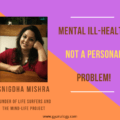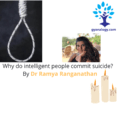To comment or receive more such wisdom, please register on www.gyanalogy.com/login
Let’s talk! Let’s live!

“Dear Mum,
It’s with a heavy heart that I write you this note, knowing the amount of pain it is going to cause you. I didn’t want to do this, but I was compelled by circumstances beyond my control to take the plunge.
I tried my best to pull through, but my best was not good enough. I battled alone for about thirteen months now until my strength failed me. You and dad could not decipher what I was going through and maybe I should not blame you for that.
My one and only brother came very close to understanding what I was passing through but it was too much for his young mind to comprehend.
Mum, I know that you and Dad loved me and did everything you could to prove that to me but I was not feeling loved. You provided for me more than I even wanted, took me to places that most of my mates have not even heard of, yet despite all these, my heart was longing for love.
I needed someone who would love me for who I was. I needed someone who could reach the depth of my soul and feel the vacuum there. The material provisions you spoiled me with could not do that. And I was alone all the while, despite the fact that we laughed together and had gist as a family.......”
This was the suicide note of a 16-year old girl dropped for her mother before taking her life.
Suicide is a tragic reaction to stressful life situations and all the more tragic because suicide can be prevented.
In the majority of cases, people who are feeling suicidal are dealing with conditions that will pass in time if only they can get the help that they need. In the meantime, there is much that friends and family members can do to help people who are depressed or contemplating suicide.
Know the Signs
Prevention first involves being able to recognize the warning signs of suicide, which can include:
- Talking about death or suicide
- Feelings of hopelessness
- Saying that they are a burden
- Withdrawing from friends and family
- Losing interest in activities
- Extreme mood swings
- Giving away possessions
- Saying goodbye to family and friends
Suicide is a serious problem and any suicide threat or attempt should be taken seriously. According to the Centres for Disease Control and Prevention, there were more than 47,000 suicides in 2018.
The following steps if taken sincerely can go a long way in preventing suicide:
1. Don't Discount Their Feelings
While you may think that their problems aren't serious enough to warrant suicidal thoughts or behaviours, what really matters is how serious they perceive them to be. If it feels important to them, then, in their mind, suicide may seem like a valid option.
Listen to what they are saying without offering judgements. Most importantly, never dismiss suicidal talk or threats. If a person is making comments that seem to indicate that they are depressed or thinking of taking their own life, you should always take them seriously.
2. Look at Suicide as a Cry for Help
When a person attempts suicide, this isn't necessarily a sign that they want to die. Instead, it's an indicator that they are in great emotional pain, but don't know how to deal with it. Suicide has started to look like their only option to escape a situation that they don't know how to handle.
If they are still alive, however, they are desperately seeking an alternative to death and attempting suicide may be their way of reaching out and saying that they need help.
3. Be a Good Listener
Being able to talk with a caring friend and unburden yourself from your troubles can go a long way in relieving the unbearable build-up of pressure that can lead to a suicide attempt.
Being a good listener doesn't require any special skills. Be patient and accepting, but avoid getting into an argument or trying to offer simplistic solutions. Avoid any "Have you tried X, Y, or Z" comments that focus on quick "fixes." Such attempts might come off as insensitive and seem to trivialize what a person is experiencing. Simply be there and show that you care.
4. Encourage Them to Get Help for Their Depression
Even though some suicides may seem to come out of the blue, it's quite likely that the person had been depressed for a very long time.
Getting immediate professional assistance at the first signs of depression is a very important step in preventing suicide.
Working to take away the stigma around depression and encouraging people who are hurting to get the help that they need right away can go a long way in saving lives because the problem is dealt with before it gets too bad.
5. Don't Be Afraid to Ask About Their Suicidal Feelings
While you may be afraid to bring up the topic of suicide for fear of giving them ideas, the fact is that those thoughts and feelings are there regardless of what you might say. What you are really doing by bringing the topic up is giving them an opportunity to open up to you and allow you to help them.
6. If They Are in Danger, Don't Leave Them Alone
If they seem to be in imminent danger of hurting themselves, do not leave them alone. Take steps to get them away from any means that they could use to hurt themselves, such as weapons or pills.
7. Encourage Them to See a Mental Health Professional
It may take some patience and persistence, but urge them to make an appointment with a mental health professional. Once they have made the appointment, continue to maintain contact in order to encourage them to follow through with appointments and treatment plans.
There are also mental health organizations you can reach out to for more information.
8. Know That Secrets Can Kill
If the person asks you to not tell anyone, be aware that you may have to break your promise in order to help them. Having your friend or loved one alive but angry with you is preferable to keeping a promise that leads to them taking their life.
It may seem to the depressed that there is no way to solve the problems in life and that suicide is the only way to end the pain. But we can help them to take steps so that they can stay safe and start enjoying their life again.

Dr. Jitendra Kumar Verma did his Masters in Psychiatry (MD) from the King George's Medical University, Lucknow. He is presently working as an Assistant Professor at Government Medical College, Ambedkarnagar, UP (India)
The views, thoughts, and opinions expressed in the article belong solely to the author.
To comment or receive more such wisdom, please register on www.gyanalogy.com/login



